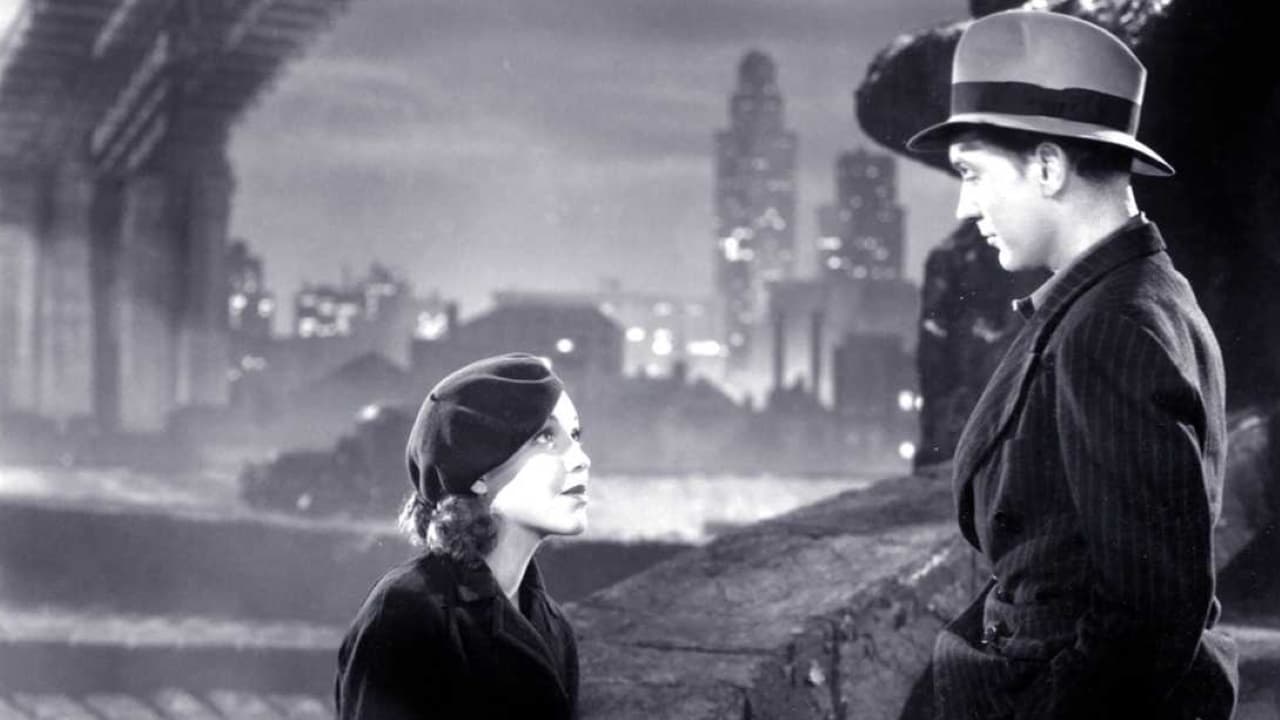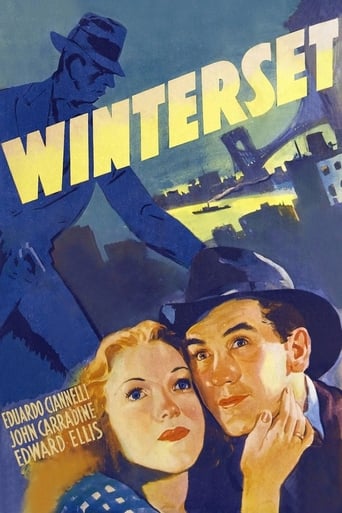

The chance to see Broadway players recreate their performances on film back in the day should never be missed. Burgess Meredith, Margo, and Eduardo Ciannelli recreate their stage roles from Winterset in this 1936 film. But the story itself is horribly dated, mostly with a lot of left wing rhetoric which gets in the way of the plot.Probably back in 1936 no one cared as the cause of Sacco&Vanzetti was still fresh in everyone's mind. Today it is still debated by historians and legal scholars and the two working class Italian-Americans are still venerated in Italian-American households of a more liberal persuasion in their politics. But the average American today knows the case vaguely if at all today.The men went to the electric chair in Massachusetts protesting their innocence as does John Carradine in this film. Before Carradine dies he imparts a sense of mission to his son who grows up to be Burgess Meredith to find the real guilty parties.A review of the case by a law school class saying that the state electrocuted the wrong man brings new attention to the case, not something that Eduardo Ciannelli likes. He was the real trigger man in the case and now he's a big shot gangster.Rather improbable events bring Meredith, Ciannelli, the judge Edward Ellis now a drunken derelict, Paul Guilfoyle another accomplice, Guilfoyle's father Maurice Moscovitch and his sister Margo all together on a rainy and stormy night.Maxwell Anderson wrote the original play and I have to contrast it with another of his plays that made it to the screen, Key Largo. It was another film where various folks are trapped in a storm and interesting things happen. Winterset never really sheds its stage origins and can't shake the rhetoric. Contrast that to Key Largo which never loses your interest for a second and while most of the action takes place in a closed down out of season hotel where the cast is holed up you never get any sense of staginess in it. The rhetoric is there, but it never gets in the way of the story as in Winterset.Even with Oscar nominations for Art Direction and Musical scoring Winterset is a relic of bygone days.
... View MoreDespite having read the liner notes, I thought from the publicity artwork that WINTERSET would be something Gothic. It is Gothic, in its bleakness, but is squarely centered in the Depression era of the United States. It was completely of it's time, and considering that the film was adapted from the Broadway play, it must have been daring, with sub themes of socialism and police corruption. (The play was by Maxwell Anderson, who wrote KEY LARGO and THE BAD SEED.) Perhaps that contributed to the film receiving two Academy Award nominations.This is the story of Mio (Bartholomio a young, dewy Burgess Merideth) trying to clear his father's name. In the first scenes, his namesake Father, played with riveting stillness by the painfully thin John Carradine, was accused of murder he did not commit, given no defense, and put to death. Years later, his son goes to the slums of New York to try to find out the truth.I had to remind myself that this was made in 1936, so it is still very early in the talkies. The sets are a wonderful blend of realism and expressionism (similar to the famous stage sets of Arthur Miller's A VIEW FROM THE BRIDGE), giving this a Gothic noir flavor. Rain is often used as a "purifier" in stage and film, but here it is effectively used to create an oppressive humidity, a torrent of sludge. It is clear that film noir, Orson Wells, and THE THIRD MAN's Director Carol Reed all owe a debt to early films like this. The set elements are all here in tight proximity, the stone, the shadowed doorways, the waterways.In fact, one irony is that one of the lead actors does look very much like Orson Wells. He plays the brother of Mariama (played by Margot, who is probably best known as the duplicitous woman in Capra's LOST HORIZON). Margot's transition to film is not as ideal as Merideth's, her style is more of the old school careful vocal production that may be the product of overcoming an accent. But she looks luminous and innocent, and fills the screen with a simple hopefulness at odds with the dark surroundings. The villain of the piece is simply fantastic completely believably sociopathic without any extravagant ticks or frothing at the mouth.This is pre-method-acting, but that spare realism is all here, especially in the performances of Carradine and Merideth. This entire film holds up as a moment of history of social themes and thought of that day that still resonate. The Broadway cast seems to have been lifted intact (which should be a lesson to modern filmmakers to use stage actors instead of vice-verse). There are one or two flowery monologues, but for the most part, the transition from stage to film goes very well, and the story and script are spare and universal enough to stand the test of time well. This is a fascinating moment of film history which has luckily made its way to DVD.
... View MoreThe drama itself is interesting to watch in this adaptation of Maxwell Anderson's play, and the themes that it brings out include some particularly weighty ones. The solid cast included at least three performers who were continuing their Broadway roles, and while the production does have a stagy feel at times, it often seems rather appropriate to the material.The brief prologue shows a political extremist (who is presumably also an immigrant) wrongly accused and executed for a murder committed by a holdup gang. The circumstances are similar to those in some notorious real cases of a slightly earlier era, in which politically unpopular persons were railroaded into convictions because of the public's fear of their beliefs.The main action starts with Burgess Meredith portraying the executed man's son, now an adult, and determined to get to the bottom of the case despite the obstacles that have come with time. In the course of things, he encounters the judge who had presided over his father's trial, a witness with important information, and a brutal crime boss who is determined to prevent the case from being re-opened. The setup produces some good psychological and ethical tensions, in addition to the drama on the surface.Most of the supporting cast performs well. John Carradine has a brief role as the father, Margo has a good and important role as a young woman torn between family loyalty and her attraction to Meredith's character, and Eduardo Ciannelli believably portrays the soulless, desperate crime boss. Mischa Auer succeeds in a brief, atypical role as a street agitator. But Edward Ellis gives the best performance, as the judge whose conscience has been tormented ever since the fateful case. The characters and the tragic situation that links them are all effectively portrayed.
... View MoreCall it Vintage, if you will, but you will not call Winterset boring unless a world of interesting details bore you. The movie is full of sub-stories, full of details that bring back the early days of everyday troubled life for Americans, especially New Yorkers. While not actually typical, the story is one that hangs together.I suspect the story plot and actor management of the story were perfected on Broadway long before going to film. It is both engaging and fascinating for movie buffs who are students of the perfected B/W film and is a study in filmography which makes one wonder if this is not the height of perfection, if you will, concerning films of that genre: Good story, good delivery and good conclusion.The story is not one with a tragic ending for the principles. It is not one that builds up the viewer's expectations and hopes and then dashes them in the end. While there are hints of evil and tragedy, the people most deserving receive this end, the ones who deserve the best of the ending actually do get the best in the end.The organ music is superb for selection and for an almost hypnotic melody that plays on in one's head for some time afterward. A nice, pleasant melody. And on it hangs the turning point in the movie, a grand hook to hang the ending.The antics of the policeman is what one would expect of one of New York's finest of that era. A masterful job of acting.Most of all, Margo! She was again engaging, spell-binding and her job well-done. She caused the viewer to want to provide her sympathy from a good and kind father, who was incapable of doing all he could for his children, and to a brother who was caught up in a crime and later regretted it and who endeavored to correct his mistake. Again, superb acting.Overall, Winterset stands out as one of the most enjoyable movies I have ever watched. I try to share it with friends who have never seen it before. None who see it for the first time have been disappointed.
... View More